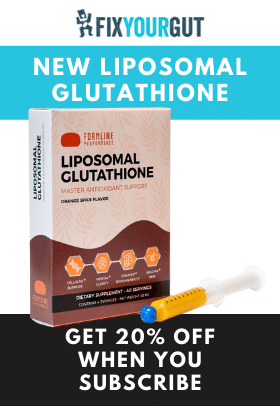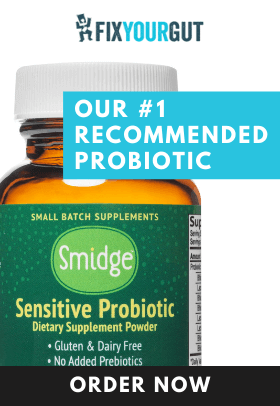If there were one “magic” supplement, that could improve reflux symptoms for most people it would be D-limonene. I have taken orange oil myself occasionally throughout the years with mostly positive effects on my H. pylori upper gut dysbiosis. For example, I contracted the norovirus a few years ago from my son and I thought my H. pylori dysbiosis had returned shortly after. My silent reflux was back, and I had foul-smelling hydrogen sulfide burps. I took two softgels of D-limonene every day for a week, and my dysbiosis resolved itself. My digestion returned to normal. So what is D-limonene and how can it improve your digestive health?
D-limonene, the Most Important Supplement to Relieve Heartburn (GERD)
Limonene is a colorless, cyclic monoterpene that is the major component in citrus fruit peel oil. Limonene takes its name from lemon peels. However, most limonene supplements are obtained from orange peels, either through centrifuge separation or steam distillation. Most limonene is used either as a fragrance for the cosmetic industry or an industrial cleaner. Limonene is also used as flavoring agent in many food products, drinks, and chewing gums. I use D-limonene around the house as a natural botanical insecticide, and it works pretty well keep the outside fire ants from coming into my house (I recommend and use the product Orange Guard). Orange essential oil can be used for aromatherapy (I do not recommend its use around pets or young children it may irritate their lungs), can be taken internally when mixed with a carrier oil (like coconut oil), and topically. Lucky for us, limonene has many health benefits associated with its use.
A chemist, Joe S. Wilkins from Texas suffered from GERD (gastroesophageal reflux disease) for years and searched for alternative treatments. He was working with orange oil trying to formulate natural cleaning products, and he accidentally consumed some of the limonene that was left on his hands.1 After drinking the D-limonene, he noticed that his heartburn was gone and his esophageal inflammation was relieved. D-limonene is an extract from orange peel, which has extremely low toxicity in humans,2 and is GRAS (Generally Recognized as Safe)3 as a food additive and supplement. The daily intake of just one 1000 mg soft gel of orange oil every other day for twenty days has been shown to reduce or eliminate GERD symptoms in most people for six months or longer.4
Orange oil is lighter than water,5 so it floats to the surface of gastric juices in the stomach. When someone is refluxing, orange oil coats the esophagus, protects the esophagus from acid and gastrin, reduces inflammation, and helps heal erosions.6 D-limonene also increases vasoactive intestinal peptide production which promotes proper motility, secretion of bicarbonate and water into pancreatic juice, stimulation of bile production, regulates stomach acidification by regulating pepsinogen and gastrin production, and helps limit osmolarity in the intestines (prevention of diarrhea). VIP is also anti-inflammatory, realigns a stressed circadian rhythm, reduces anxiety, and has antimicrobial properties. D-limonene also increases gastric emptying, improves stage 2 liver detoxification, increases cellular glutathione production if needed, and increases bile production and release.7 8
So how does D-limonene improve reflux and stomach trouble? Orange oil, when burped up, coats the esophagus, protecting the esophagus against caustic contents that would have otherwise been regurgitated from the stomach. D-limonene may stimulate quicker gastric emptying, so less gastric acid, bile, pepsin, and endotoxins remain in the stomach to be refluxed.9 By increasing gastric emptying time, orange oil also reduces fermentation in the stomach and the duodenum, relieving bloating and gastric pressure, reducing reflux. Finally, D-limonene might inhibit Gram-negative upper gut bacterial overgrowth like H. pylori and Provetella, leading to a reduction in endotoxin inflammation and reflux, reducing inflammation in the duodenum, stomach, and esophagus. D-limonene might also help improve the stomach mucosal lining and promote the healing of ulcerated tissue. Finally, D-limonene increases the activity of macrophages (white blood cells that eat microbes to eliminate them from the body), which may help people suffering from dysbiosis by improving their immune function.10
Finally, one interesting fact I discovered about D-limonene and the digestive system is that it was studied in Japan to be used to dissolve gallstones, in people with gallbladder disease. D-limonene was injected into the billary system of about two hundred patients to dissolve their gallstones to prevent the need for gallbladder removal. Gallstones dissolved completely in the gallbladder in about half of the cases (ninety six) and was ineffective in about twenty-five percent of the cases (fifty-nine). The rest of the cases in the study had partial dissolution. I believe that more studies need to be performed to see if we can use this method to safely preserve the gallbladder instead of having it removed if it is full of stones and causing blockage.
Other Positive Health Effects of D-limonene Outside of the Digestive Tract
D-limonene has strong systemic antiviral effects against the virus family Herpesviridae (may help against Herpes Simplex 1, Herpes Simplex 2, and Varicella [chickenpox, shingles] reactivation). “These results suggest that the investigated drugs directly inhibit herpes virus infection and might interfere with virion envelope structures or mask viral structures which are necessary for adsorption or entry into host cells. The inhibition of HSV by the tested monoterpenes appears to occur before adsorption but not after penetration of the virus into the cell. It remains to be determined whether the inhibitory effect of compounds is due to binding of the compounds to viral proteins involved in host cell adsorption and penetration. De Logu et al reported an inactivation of herpesviruses and prevention of cell to cell spread by Santolina insularis essential oil. However, no antiviral effect was observed during the intracellular replication phase, which is in accordance to our results for monoterpenes. Isoborneol, a monoterpene and a component of several plant essential oils, showed virucidal activity against HSV-1 and specifically inhibited glycosylation of viral proteins. The application of the monoterpene cineole protected mice against infection with HSV-2. Since, essential oils are able to inhibit acyclovir-resistant HSV-1 isolates, the mechanism of interaction between essential oils and these compounds and acyclovir with HSV must be different. Acyclovir inhibits virus replication by interference with the DNA polymerase inside the cell, whereas monoterpenes probably inactivate HSV before it enters the cell. Astani et al. also showed high antiviral activity for essential oils and isolated monoterpenes when herpesvirus was incubated with these drugs prior to host cell infection. Viral resistance to acyclovir represents a particular problem; the prevalence of resistance in acyclovir-treated immunocompromised individuals is approximately 4 to 7%.” Orange essential oil also provides pain relief and accelerates healing when it is applied to canker and cold sores. I recommend using a natural orange flavored lip balm when you are suffering from cold sores.11 12
Limonene has shown sedative properties, which may help those with anxiety disorders. Limonene increases GABA(gamma-Aminobutyric acid) production in the brain (by its metabolites perillic acid and perillyl alcohol activating the GABAA cellular receptors), reduces glutamate excitability, and may prevent neurotransmitter (serotonin, dopamine, and norepinephrine) overproduction (which may improve mood, reduce anxiety, and improve brain fog). Limonene is also shown to have anti-seizure properties, more than likely from its ability to reduce glutamic acid neuronal over-excitability. Limonene binds to and activates the adenosine A2A receptor which helps to regulate glutamate, GABA, and dopamine release. Finally, limonene has been found to reduce stress hormone cortisol serum levels, improving adrenal fatigue in people with elevated cortisol.13 14 15
Research has also shown that D-limonene might also have anti-cancer properties. Limonene prevents the growth of cancer cells by inhibiting growth controlling G proteins (guanine nucleotide-binding protein, inhibits mainly p21ras), that is signal transducing molecules that induce cell growth. Limonene inhibits posttranslational addition of hydrophobic groups to the G protein peptide precursor, which is necessary for the growth controlling G proteins to function properly, therefore eliminating cancerous cells by reducing growth and replication. Limonene reduces breast cancer growth by inhibiting the expression of cyclin D1 and IL-6. Cyclin D1 speeds up cellular progression, allowing cancer cells to proliferate faster. Finally, in stomach cancer cells, limonene decreased BCL2 (B-cell lymphoma 2 gene), increased p53 (tumor protein 53 suppressor gene), decreases VEGF (Vascular endothelial growth factor, tumor’s ability to receive blood flow), reduced H. pylori, and reduced inflammation (inhibits the inflammation inducers TNF-α and NF-κB) inhibiting cancer growth and inducing cancer cell apoptosis.16 17 18 19
Potential Side Effects of Limonene Use
I do caution the use of D-limonene in people with an elevated Th2 immune system (histamine intolerance or mast cell activation disorder) or individuals with severe gastritis, and it may make them worse. Orange oil can also be sedating for some people if so take it with dinner instead of breakfast if it makes you sleepy or sluggish. Limonene used in topical products has rarely been shown to cause dermatitis potentially. Other rare side effects of orange oil supplementation are increased esophageal inflammation, aspiration, and breathing issues.20 21
My Recommended Brand of Limonene
I recommend that you either use the limonene supplement Orange Burps, in easy to swallow softgels. In addition, be sure to follow the supplement instructions as well. Most people take limonene with a meal to prevent gastrointestinal upset. I recommend most people take one to two capsules in the morning with breakfast, but if the supplement becomes too sedating you can take it with dinner. Orange oil is very important for protecting the esophagus and stomach, relieving inflammation in the digestive system, and reducing and preventing dysbiosis. I recommend trying it if you are dealing with heartburn today and find some relief.
- http://www.lef.org/magazine/mag2006/sep2006_cover_heartburn_01.htm ↩
- http://www.epa.gov/iris/subst/0682.htm ↩
- http://www.ncbi.nlm.nih.gov/pubmed/18072821 ↩
- http://www.lef.org/magazine/mag2006/sep2006_cover_heartburn_01.htm ↩
- http://www.biochemcorp.com/dlimonene2.htm ↩
- http://www.lef.org/magazine/mag2006/sep2006_cover_heartburn_01.htm ↩
- http://www.altmedrev.com/publications/12/3/259.pdf ↩
- https://selfhacked.com/blog/vip-a-potent-anti-inflammatory-hormone-and-natural-ways-to-increase-it/ ↩
- http://www.altmedrev.com/publications/12/3/259.pdf ↩
- http://www.lef.org/magazine/mag2006/sep2006_cover_heartburn_01.htm ↩
- https://www.ncbi.nlm.nih.gov/pmc/articles/PMC4393490/ ↩
- https://www.google.com/patents/CA2591352A1?cl=en ↩
- https://www.jstage.jst.go.jp/article/jnsv/55/4/55_4_367/_pdf ↩
- https://onlinelibrary.wiley.com/doi/abs/10.1002/smi.1158 ↩
- https://www.jstage.jst.go.jp/article/bpb1993/23/11/23_11_1314/_article ↩
- http://www.ncbi.nlm.nih.gov/pubmed/9654110 ↩
- http://www.ncbi.nlm.nih.gov/pubmed/19968502 ↩
- http://www.ncbi.nlm.nih.gov/pubmed/23117412 ↩
- http://www.ncbi.nlm.nih.gov/pubmed/22935404 ↩
- https://selfhacked.com/blog/supplements-people-th2-dominant/ ↩
- http://www.who.int/ipcs/publications/cicad/en/cicad05.pdf ↩







I see all the suffering here and wanted to tell you all I did find something that after over twenty years of reflux changed my life. The book Acid Watchers Diet. It’s a 28 day plan that will change your life. Worth sharing.
Would you know if this product would help “Silent Reflux?” (Laryngopharyngeal reflux, LPR)
Does this product help eosinophilic esophagitis? Mainly caused from either food allergies or acid reflux?
any info about sea buckthorn oil for GERD as i see terry naturally europharma employs it in their Advanced Heartburn Rescue formula ”
can any one find a formula that includes d-limonene and sea buckthorn oil and ellagic acid ?
any info about ellagic acid from pomegranate for GERD ?
i see the brand super smart employs it in their anti acid reflux gut health formula
Hi John,
Is it safe to take both d-limonene and hcl at the same meal?
Yes, many people do.
John,
Do you know if D-Limonene safe for those who are pregnant?
Unknown, there are no studies to determine its safety.
Thanks for the post! I’m purchasing the d-Limonene liquid (food grade by Blubonic Industries). I prefer buying the liquid form because all the softgel options use animal products (gelatin). Do you know the equivalent dosage in liquid form to 1000mg? Is it strictly weight? 1000mg (1g) of liquid seems like it would be a lot.
I am taking the liquid form (same brand you mention), too. mixing with coconut oil
day 4 of Limonen_E drops, taken in morn. Still have acid after evening meal..suggestions please?
Take it DURING your evening meal.
Are there any complications of taking D-Limonene with digestive enzymes of Betaine HCL?
I have fibromyalgia. I also suffer with herd and I have no gall bladder due to gall stones. I was on omeprazole , but I read that this drug was dangerous so weaned myself off them. I still have gets but not as bad as I am now gluten and dairy free. I was very interested in this article and taking D – limonene but am unsure as I have no gall bladder , would this be ok ?
Hi .. I have just been diagnosed with grade c aesophagitis .. my doc has never heard of Di-limonene. I am again on PPI meds and my question is .. given I have moderate to severe inflammation in my aesophagus is it safe to take Jarroe Di-limonene and if safe do I take 1000 mls in one dose or should I take 500mg morning and night?
Possibly, ask your doctor about it.
Hi,
Thank you for the information about d-limonene. I had an endocospy in early 2017 and dr prescribed carafate for bile reflux. I feel I have both bile and stomach acid reflux though. Since then I’ve been doing acupuncture with Chinese herbs, carafate, probiotics, digestive enzymes but still have problems of acids going up to my throat at night. Today, I just stepped down from a 14 day treatment of PPI, and I’m taking marshmallow root powder whenever my stomach hurts, zantac 150 1 time at bedtime then wake up two hours later to take 1 mg carafate. Felt some heartburn but I felt acids didn’t come up that much this time. Do you think I could try d-limonene with all the things l have mentioned and with having bile reflux (since you said d-limonene can produce more biles)? Thank you!
Pam
Just starting to take D-Limonene and taking 1000 mg every other day for 20 days. Should I continue to take my Ranitdine 2X a day until the 20 days are over, or just take it if I feel I need to?
Thank you for this information. I took a bottle of the 1,000 mg according to the protocol, and it did help, but it didn’t cure my GERD. I had an endoscopy and found I have Class C esophagitis and gastritis. I bought the liquid D-limonene and started taking one drop a night before bedtime. I gradually worked up to 4 drops over the past month, but am also taking Zantac 150 4x a day by doctor prescription. My GERD is still there, and I dare not miss an acid blocker pill, or it gets worse. My doctor gave me 12 refills of the Zantac, so I’m assuming he expects me to take it forever, but I don’t want to, so I’m going to try to wean myself off after 2 months on it. I’m taking the D-Limonene daily, since I’m not sure of the dosage for the liquid. I sort of judge it by the burps. Once I stop burping after a dose, I increase it. It does seem to be helping with my depression and sleeplessness.
I read somewhere that you should take the 20-day protocol, then get off it for awhile. I also read that large doses are not usually harmful, but nowhere have I seen if it’s safe to take every day. What do you think?
Dear Amie,
It appears to be safe for use for a couple of months, it has been used for months in studies. Of course, run everything by your doctor. http://www.cygnetenterprises.com/files/Limonene12-3.pdf
John
I got diagnosed with Barrets esophagus. Im taking prilosec. Will this help with that? I see the side affects U noticed in the article says aspiration and breathing problems which is concern.
If you stay on the acid blockers, you’ll never have a chance of curing your GERD. I’ve been suffering from terrible GERD for a decade now, on PPIs for several years. I finally quit taking them a month ago and am trying a very careful diet and natural rememdies like limonene and other things. Good luck.
https://chriskresser.com/get-rid-of-heartburn-and-gerd-forever-in-three-simple-steps/
“taking Zantac 150 4x a day by doctor prescription. My GERD is still there, and I dare not miss an acid blocker pill, or it gets worse. ”
Just want to share with you my experience; take it with a grain of salt. However I would suggest getting off the antacids/blockers. They are probably causing more harm than good in the long run. You may be building both dependency and tolerance to the drug.
I’m 32, when I was ~15 I went to the doctor because of heart burn, acid up the throat, uncomfortable to lay down, keeping me up all night etc… Diagnosed with GERD. I was put on 24 hour antacids for a few weeks. When I got off them, YES, it was ABSOLUTELY TERRIBLE; worse than it had ever been.
However the conclusion I drew is the real fix was to figure out what was actually going on, or at worst find non-pharma ways to manage (that’s all you’re doing anyways, might as well be natural). Having been on the harsh antacids/acid blockers or whatever they were; seemed to leave me to depend on off-the-shelf antacids initially and as I learned to cope over the years. I rarely ever have to use them these days. A lot of times I’m just using water to manage any instances of burn (avoid water before/during/after meals, don’t want to dilute digestion). DIET is a GIANT factor. I’m going to try d-limonene for my first time soon.
I’ve read in cases that seems like GERD it could be a bacteria that thrives on sugar/starches, producing excess gas and therefore excess pressure. The fix was to go on a high protein diet (maybe some complex carbs) for awhile, and keep excellent oral hygiene. The idea is that will cut off their food supply, and ‘normal’ bacteria can re-gain control.
In conclusion, the sooner you can get off the ant acids, the sooner you can really get some control over the situation. And I’m pretty sure you can’t heal your gerd while on such meds; mine sure didn’t. Apparently as you also know it only makes it worse, granted you only NOTICE once you stop. But worse is worse, and you weren’t born with a life-time supply of zantac.
However far-fetched, in the case of a societal collapse, you might have to deal with this actuality. That without these drugs, you would have to figure out how to deal with it by listening to your body.
All we have is our own subjective experience.
PS it will be awhile after you’re off the acid blockers for your body to adjust. And no it’s NOT fun; but if you don’t go back you only have to go through it once.
I don’t know how old this article is. But I wanted to tell you yes. Stop those drugs gradually then never take them again. They will ruin your kidneys. The best way to end reflux is to get the book Acid Watchers Diet and follow it for the 28 days. It works. It took about a week and I finally had days with no acid reflux. It was a miracle.
This is in response to the person taking one to four drops — that is quite a bit less than the dosage used in clinical trials. Suggest buying a dropper that has ml marks and dose accurately.
If it works at the clinical dose you can always taper down to the smallest amount that still works for you.
I don’t completely understand the logic behind the twenty days / every other day dosing, followed by six months off. Haven’t found any reasoning for this protocol other than the fact that they tried it and it worked.
Is the short duration of treatment to prevent tolerance / sensitivity/ both?
I doubt we’ll see better clinical trials in future — it is not a patented substance so not a lot of research profit.
Hi John, thank-you for your page! I started my son and Husband on D-Limolene and in my research I really liked the effects it can have, so I started the jarrows formula for prevention. Is D-Limolene safe to take daily indefinitely fore protection (as my Mother had breast cancer and I have been proactive)?
Dear Michelle,
I cannot say it is safe for daily usage, but it has been taken daily for months in studies with great toleration.
John
Can you take d limonene indefinitely? I tried the 20 day course and felt marginally better but now I have acid teflux 24/7. I only take bicarbonate and water to ease pain. If it’s safe I’m happy to continue it everyday second day forever.
Dear Cassie,
I cannot say it is safe for daily usage, but it has been taken daily for months in studies with great toleration.
John
If I don’t have a gallbladder can I still take D-Limonene?
Yes, watch out for bile acid malabsorption diarrhea which can occur from it triggering a strong bile release.
Have you read anything that would indicate this D-Limonene can dissolve gallstones?
Yes, when injected into the gallbladder in a medical procedure. It does increase bile production and release which may break down gallstones overtime. http://www.altmedrev.com/publications/12/3/259.pdf
Thank you John. Very well researched and written blog. I got a lot of good information from your site. I wish MDs were as well informed.
Thank you for the kind words Bart.
I have been suffering with acid reflux been taking pepcid couldn’t go with out one day with out it started d-limonene for 3 days with out pepcid symptoms almost totally gone . I see that recommended dosing is every other day. I took 3 days in a row so far going to start every other to see if symptoms stay away this is definitely worth trying
Would you anticipate a negative reaction between digestive enzymes and d-limonene?
You may irritate the stomach lining from the digestive enzymes and from the endotoxin die off from the D-limonene, but that would be rare and limonene is cytoprotective of the stomach.
Is there a particular time of day you recommend this be taken? With/without food, etc?
Dear Jo,
I like taking it with dinner, it has a calming effect. I would always take it with food to lessen stomach upset.
John
John i am hesitant to tru such a large capsule
I purchased 2 bottles from Jarrow as food often
gets stuck in my esophagus -is their a liquid
form of d-limonene or smaller capsule ? I would love
to try this product as I have constant heavy mucous.
thanks
Nancy
Nancy – Google the brand Orange Burps. They have smaller softgel capsules. They’re easier to swallow, and you don’t have to take as much at once if you don’t want to.
Dear Nancy,
I recommend Orange Burps now which is a smaller softgel. https://orangeburps.com/
John
Jarrow has recently reformulated their softgels to be smaller and they are now selling a bottle of 120 capules, with 2 capsules constituting a 1000 mg serving.
I notice that Amazon reviews for Jarrow D-Limonene 1000 mg softgels run about 300 positive to 100 negative. Not a bad ratio, but some of the negative reviews speak of serious stomach discomfort, nausea/vomiting, and reflux that is exacerbated by the pills. Any thoughts on why the large divergence in experiences?
Dear David,
Die off causing increased inflammation and Th2 histamine reactions.
John
Took the 20 day course for gerd and stopping Prevacid 24 after 10yrs of use can i just take it as needed sometimes i feel bloated when i take it reflux is better
Yes, you should be able to take it as needed, but ask your health care professional to be sure.
I’m getting down to the last few of 60 1000mg d-limonene softgels. I’m not cured, but I’m pretty sure they’ve helped with my reflux. I wonder though, should I buy another container and continue to take them?
I would assume it would be safe to take another bottle to see if it helps, but make sure you get the approval of your health care practitioner.
Hey john, I just stopped buy your blog after searching for gerd problems several times, i see you keep posting information regularly, so I’m a little confused, i want all in formation as possible cos i’m really desperate to heal myself, my question is that if i buy your e-book maybe i won’t have to check on your posts daily right? or not? answer me plz
Most of my posts are new information that may not be in the book. The book is a good reference and full of good information. Some of it is on my blog and some of it is in the book only.
I live in Canada and have been a follower of John Brisson from the time his first edition of Fix Your Gut came out. My doctor recommended Jarrow Limonene as part of the protocol to get me off Nexium (20 years and many unsuccessful tries.) However, I could not find Jarrow or Enzymatic Limonene in Canada. Jarrow can be ordered through Amazon, but will take some time to arrive. However, with a little searching one can find Limonen-E made by Vita-Aid Professional Therapeutics (manufactured in British Columbia). Just thought I would pass this information along for any Canadians looking to buy Limonene.
What do you think about gelcap VS liquid form of D-Limonene?
Im thinking about taking organic orange essential oil. (This is D-Limonene, right?)
Would you suggest one is better than other?
The orange essential oil contains more terpenes and maybe harsh.
What are side effects of D Limonene?
For some it can cause irritation in the esophaugus and cause herx reactions from die off. It rarely can cause breathing issues from aspiration, but for most it is well tolerated.
Hi
I have been suffering with lpr for the past 6 years, constant lump in my throat and struggle to talk. Been on lansoprazole and that seems to make my throats worse. Will d-limonene, reduce this feeling in my throat or even better get rid of it!
Thanks
does D-limonene help loose esphogus sphincters? I am desperate. many thanks help please
Yes it can, by reducing inflammation and the sphincter’s contact with acid, pepsin, bile, and or endotoxins.
Hi,
Thank you for all the useful information on your site.
D-Limonene…wouldn’t that be considered citrus that GERD and LRP sufferers are supposed to avoid?
Any clarification is helpful!
No, D-limonene is a component of citrus, it is not the citric acid which does the most damage to an inflammed esophagus. D-limonene in studies have been shown to be protective of esophageal tissue.
I have been taking d-limonene for about a year now. No bloating at all and I am a former (no longer) IBS sufferer!
I decided it was time to come off the Omeprezole that I took for decades. After researching the long term effects of taking this stuff, I decided I must stop taking it. Nice how the Dr’s never tell you about the rebound effect and that you shouldn’t take this stuff long term. It has been a very difficult process. The rebound effect of more acid then you ever had before is awful. Now I take Ranitdine 2X a day and the D-Limonene usually twice a day. The D-Limonene is amazing stuff! I don’t know exactly how it works, but it does. I was desperate to find something and after a lot of web research, I found this stuff. Whew! Hopefully, the rebound effect will ease up. It’s been about 6 weeks since I stopped the Omeprezole.
what about the use of d-limonene if you have an ulcer, or feel like you do?
Use with caution, it may help but if the ulceration is severe enough it may cause inflammation.
John
How would you incorporate this with your other protocols? E.g. would you wait until H Pylori eradication?
Thnaks
You could use D-Limonene with any of the protocols, it wouldn’t hinder any of my protocols. The only reason one would’t use d-limonene is if they had any side effects with the supplement.
Have you noticed if it causes bloating in any of your clients initially, but goes away after using the supplement for a few days?
Yes, it could be from die off creating excess hydrogen and causing bloating.